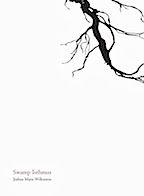
Book Review: Swamp Isthmus by Joshua Marie Wilkinson

Swamp Isthmus
Poems by Joshua Marie Wilkinson
Black Ocean, April 2013
ISBN-13: 978-1939568007
$14.95; 88pp.
Reviewed by Anne Shaw
Joshua Marie Wilkinson examines the flotsam and jetsam of history in his new collection, Swamp Isthmus. These small, image-driven poems conceal serious questions about our collective failure to reckon with the past. Throughout the collection, history figures as something the living no longer know how to access: “I keep / asking the dead / the wrong set of questions,” Wilkinson’s narrator laments (“a radial droplight” 22). At the same time, a sense of threat emanates from the dead, who watch and note our failures. “If images are what / history decays into // we bring our enemies / home” the narrator warns (“little star of salt” 35). The key concern is not what the dead owe us, but what we owe the dead.
Awash in a post-Katrina landscape of flooded houses and stranded dogs, objects come unmoored from their historical periods, intermingling with our own. The narrator is variously carryinis variously carrying a slide rule (“we stand in” 3), “holding my cellphone as a lantern” (“her mother’s in hip waders” 68), or watching as “nightgowns & hymnals / of the so called living / tread nightly off” (“nightgowns & hymnals 64). In this way, the living come to be haunted by the past they have forgotten.
Wilkinson also subtly examines literary history, raising pertinent questions abut the relationship between contemporary poetics, the pastoral mode, and the legacy of Romanticism. Momentary references in the poems evoke a range of poetic figures and periods. “I am sorry I want / a sloe plum,” Wilkinson writes, subtly invoking a nostalgia for Williams. Though remade in contemporary terms, romantic affection and the pastoral mode are persistently present: the collection begins with a landscape in which “we stand in / for the moon.” Yet, as the collection’s title implies, the territory is murky and potentially treacherous: “the pastoral smarts” (“lingering ferry slag” 7), and “the moon / drifting way too close / gets leaky” (“so then the moon” 41).
If there is a flaw in this intricate, subtle, and intelligent collection, it is that the slight appearance and sometimes-baffling juxtapositions of these poems can easily allow the reader to skim past their deeper resonances. “What you can’t hear / is what’s watching you” Wilkinson’s narrator admonishes the pigeons (“from aluminum sky” 19); so, too, in our relationship with the past. Swamp Isthmus stakes out a territory in which history and emotion not only surface but begin to resonate.
Anne Shaw is the author of Undertow, winner of the Lexi Rudnitsky Poetry Prize, and Dido in Winter (Persea Books, December 2013). Her poems have appeared in journals including Harvard Review, Black Warrior Review, Denver Quarterly, Crab Orchard Review, Prairie Schooner, and New American Writing. Also a visual artist, she is currently a graduate student of writing and sculpture at the School of the Art Institute of Chicago. Her work can be found online at www.anneshaw.org.

thank oneself for this exceptional report. It served me alot.
Thank you very much to your interesting text. I am interested in such message for the really period of time. Thanks a lot.
Food cravings may occur when someone tries to quit smoking due to increased anxiety.
I am really inspired with your writing talents and also with the format on your blog.
awesome!
Im happy about this